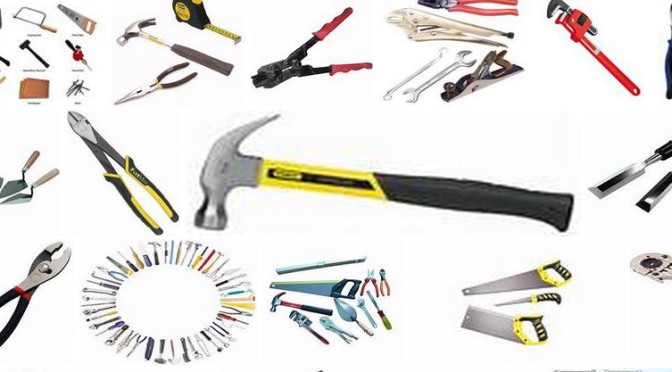When you are getting started, it’s hard to decide what to buy, or what you need to have in your toolbox or tool bag. So, I thought we’d have a quick look at the collection that most of us end up with at some point, or the basic tools for a workshop. In the future, we will add to this with specialty hand tools, power tools and more! Tag along and let me know if you think I missed anything…
Safety Stuff
- Safety Glasses
- Ear plugs or Ear muffs
- Dust mask
- Basic first aid kit
Click here for more safety gear recommendations
- 12′ tape measure – 1/2″ wide blade, this one fits in a pocket and is light weight
- Combination square – The head slide on the rule, so you can make multiple marks at the same distance. It also lets you check for square and mark at 45 degrees.
- Rafters square – 16″x 24″ – a larger square for checking angles and marking larger items.
- Speed square – 7″
- 6″, 12″ and 36″ rules – measure, mark and draw straight lines
Hand Saws
It feels like the days of the handsaw are long gone, soooooo many electric saws to choose from… but the more I build things the less I think this. Am I likely to rip a board, or build a full piece of furniture with hand tools, not likely, but I do admire the guys who do. What I am recommending as a first purchase is a small and aggressive cross cut saw like the Stanley 20-045 15-Inch Fat Max Hand Saw. This type of saw makes quick work of cutting any wood to size. Short enough to fit in a toolbox, but a real work horse when you need it. Having this in my kit means I don’t have to drag out a power saw for a quick cut.
- 15″ Hand saw – The FatMax from Stanley is aggressive and good for general use
- Japanese pull saw – finer cuts
- Coping saw – cut circles and other shapes
General Hand Tools
You’ll need a good hammer for hanging pictures, driving nails or knocking things apart. I like a 20 oz hammer for general use. You want to try a couple out to find one that “fits”.
When looking at hammers it’s important to remember that a heavy hammer will wear you out, but it does a lot of the work for you (it requires fewer blows to drive a nail). A light hammer requires extra blows, so it can be more work.
I also like the anti-vibration handles, but they cost a few dollars more. You also need to consider the use. Both types of claw hammer will work well for you. The curved claw hammer is a great hammer for pulling nails (the extra curve helps with leverage). Rip claw is better for helping pull things apart (the straighter claws let you wedge and pry more).
- Hammers
- Curved claw hammer – 16 oz
- Finish hammer – 8 oz
- Dead blow hammer – 1 lb
- Screwdriver set, or bit set – (flat, Phillips, square, torx)
- Basic Bench Chisels – 1/4″, 1/2″, 3/4″ and 1″
- Pliers – slip joint, needle nose, side cutters
- Utility knife
- Pry bar – 15″
- Level – 24″
- Brad point drill bits (1/8″ to 1/2″ in 1/8″ increments) – great for wood
- Twist bits – (1/16″ to 1/2″ in 1/32″ increments) – general use
- Combination wrench set
- Standard (1/4, 5/16, 11/32, 3/8, 7/16, 1/2, 5/8 and 9/16 inch)
- Metric (6, 8, 9, 10, 11, 12, 13 and 14 millimeter)
- Socket set with ratchet – 1/4″ & 3/8″ drive with ratchet handle and extension – Standard and Metric
Miscellaneous Stuff
- A Book of wiring instructions
- Electric current tester – simple one for checking if the current is live
- Staple gun – hand power
- Clamps – (you never have enough) mixed sizes of adjustable clamps and clips
- Saw horses
- Portable work bench
- 1/2″ cordless drill/driver
- These can be corded or cordless. If you go cordless, go for 18v to 24v for plenty of power. Look at combination sets
- Jig saw
- Circular saw with blades (71/4″ – 24 (rough) and 40 (smooth cross cut) tooth
- Palm sander – 1/4 sheet or orbital
- Shop Vacuum
- 5 gallon bucket with tool liner – These line the bucket with canvas pockets for storing everything. Easy clean up at the end of the day
- Tool Bag – a canvas bag for holding a little bit of everything
- Tool Box – You can choose a carry around box or a large tool chest, depending on your needs
- Tool Chest – They lock, they have wheels, they take up space, but boy can you be organized
This is a general list to get you started. When shopping for tools, be a smart shopper. Do your homework. Buy the best tools you can afford, cheap tools will need replaced sooner than later.
So, what did I miss? What would you add to the tool bag?
[contact-form][contact-field label=’Name’ type=’name’ required=’1’/][contact-field label=’Email’ type=’email’ required=’1’/][contact-field label=’Website’ type=’url’/][contact-field label=’Comment’ type=’textarea’ required=’1’/][/contact-form]






